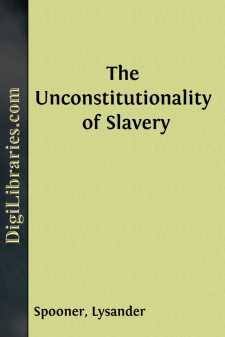Categories
- Antiques & Collectibles 13
- Architecture 36
- Art 48
- Bibles 22
- Biography & Autobiography 813
- Body, Mind & Spirit 142
- Business & Economics 28
- Children's Books 16
- Children's Fiction 13
- Computers 4
- Cooking 94
- Crafts & Hobbies 4
- Drama 346
- Education 46
- Family & Relationships 57
- Fiction 11829
- Games 19
- Gardening 17
- Health & Fitness 34
- History 1377
- House & Home 1
- Humor 147
- Juvenile Fiction 1873
- Juvenile Nonfiction 202
- Language Arts & Disciplines 88
- Law 16
- Literary Collections 686
- Literary Criticism 179
- Mathematics 13
- Medical 41
- Music 40
- Nature 179
- Non-Classifiable 1768
- Performing Arts 7
- Periodicals 1453
- Philosophy 64
- Photography 2
- Poetry 896
- Political Science 203
- Psychology 42
- Reference 154
- Religion 513
- Science 126
- Self-Help 84
- Social Science 81
- Sports & Recreation 34
- Study Aids 3
- Technology & Engineering 59
- Transportation 23
- Travel 463
- True Crime 29
The Unconstitutionality of Slavery
by: Lysander Spooner
Description:
Excerpt
WHAT IS LAW?
Before examining the language of the Constitution, in regard to Slavery, let us obtain a view of the principles, by virtue of which law arises out of those constitutions and compacts, by which people agree to establish government.
To do this it is necessary to define the term law. Popular opinions are very loose and indefinite, both as to the true definition of law, and also as to the principle, by virtue of which law results from the compacts or contracts of mankind with each other.
What then is Law? That law, I mean, which, and which only, judicial tribunals are morally bound, under all circumstances, to declare and sustain?
In answering this question, I shall attempt to show that law is an intelligible principle of right, necessarily resulting from the nature of man; and not an arbitrary rule, that can be established by mere will, numbers or power.
To determine whether this proposition be correct, we must look at the general signification of the term law.
The true and general meaning of it, is that natural, permanent, unalterable principle, which governs any particular thing or class of things. The principle is strictly a natural one; and the term applies to every natural principle, whether mental, moral or physical. Thus we speak of the laws of mind; meaning thereby those natural, universal and necessary principles, according to which mind acts, or by which it is governed. We speak too of the moral law; which is merely an universal principle of moral obligation, that arises out of the nature of men, and their relations to each other, and to other things—and is consequently as unalterable as the nature of men. And it is solely because it is unalterable in its nature, and universal in its application, that it is denominated law. If it were changeable, partial or arbitrary, it would be no law. Thus we speak of physical laws; of the laws, for instance, that govern the solar system; of the laws of motion, the laws of gravitation, the laws of light, &c., &c.—Also the laws that govern the vegetable and animal kingdoms, in all their various departments: among which laws may be named, for example, the one that like produces like. Unless the operation of this principle were uniform, universal and necessary, it would be no law.
Law, then, applied to any object or thing whatever, signifies a natural, unalterable, universal principle, governing such object or thing. Any rule, not existing in the nature of things, or that is not permanent, universal and inflexible in its application, is no law, according to any correct definition of the term law.
What, then, is that natural, universal, impartial and inflexible principle, which, under all circumstances, necessarily fixes, determines, defines and governs the civil rights of men? Those rights of person, property, &c., which one human being has, as against other human beings?
I shall define it to be simply the rule, principle, obligation or requirement of natural justice.
This rule, principle, obligation or requirement of natural justice, has its origin in the natural rights of individuals, results necessarily from them, keeps them ever in view as its end and purpose, secures their enjoyment, and forbids their violation....




